Physical Address
304 North Cardinal St.
Dorchester Center, MA 02124
Physical Address
304 North Cardinal St.
Dorchester Center, MA 02124
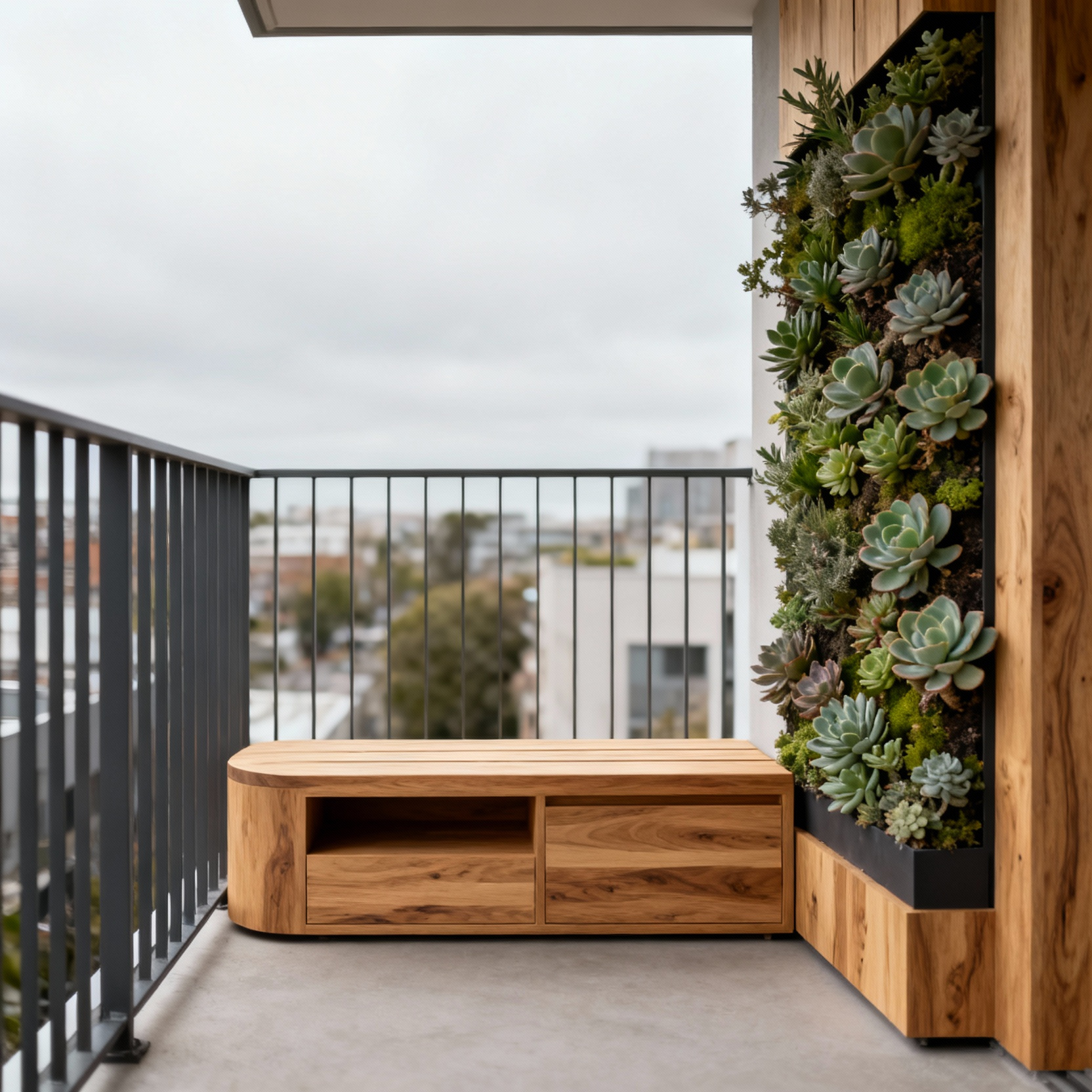
Transform your outdoor space with 20 Nordic design tips. Learn to use sustainable materials and mindful rituals for beautiful, enduring balcony decor.
Crafting an outdoor space—especially something as intimate as a balcony—is an act of self-revelation. Every choice we make reflects not just a fleeting aesthetic preference, but our deeper values about how life should be lived. The most compelling spaces aren’t just decorated; they’re authored. They tell a coherent story. And the best stories are rooted in a philosophy that values contentment, sustainability, and a quiet connection to the world around us.
This is the heart of Scandinavian design. It’s not about stark, empty rooms. It’s about creating a refuge. A place where every object has a purpose, where natural materials invite a gentle touch, and where the boundary between indoors and out begins to dissolve. These 20 principles are less a set of rules and more a way of thinking, separating a truly harmonious balcony from one that simply follows trends. This is about transforming your small patch of sky into a genuine extension of your life—a space that cradles, calms, and endures.
Let’s walk through how to compose this space, moving from the foundational ideas of why your balcony exists to the honest materials you’ll use. From there, we’ll orchestrate the physical layout and, finally, weave it into the fabric of your daily rituals. This is how we create a balcony that doesn’t just look beautiful, but feels essential.
Before a single planter is chosen, we must begin with intention. In Nordic design, the ‘why’ always precedes the ‘what’. This is about creating a space that serves your life, not just one that looks good in a photograph.
The Swedish concept of lagom—not too much, not too little—is the perfect antidote to modern excess. It’s about finding a beautiful equilibrium. On a balcony, this means every piece must earn its keep. You don’t fill the space; you curate it. Ask yourself: does this serve a function? Does it bring a quiet joy?
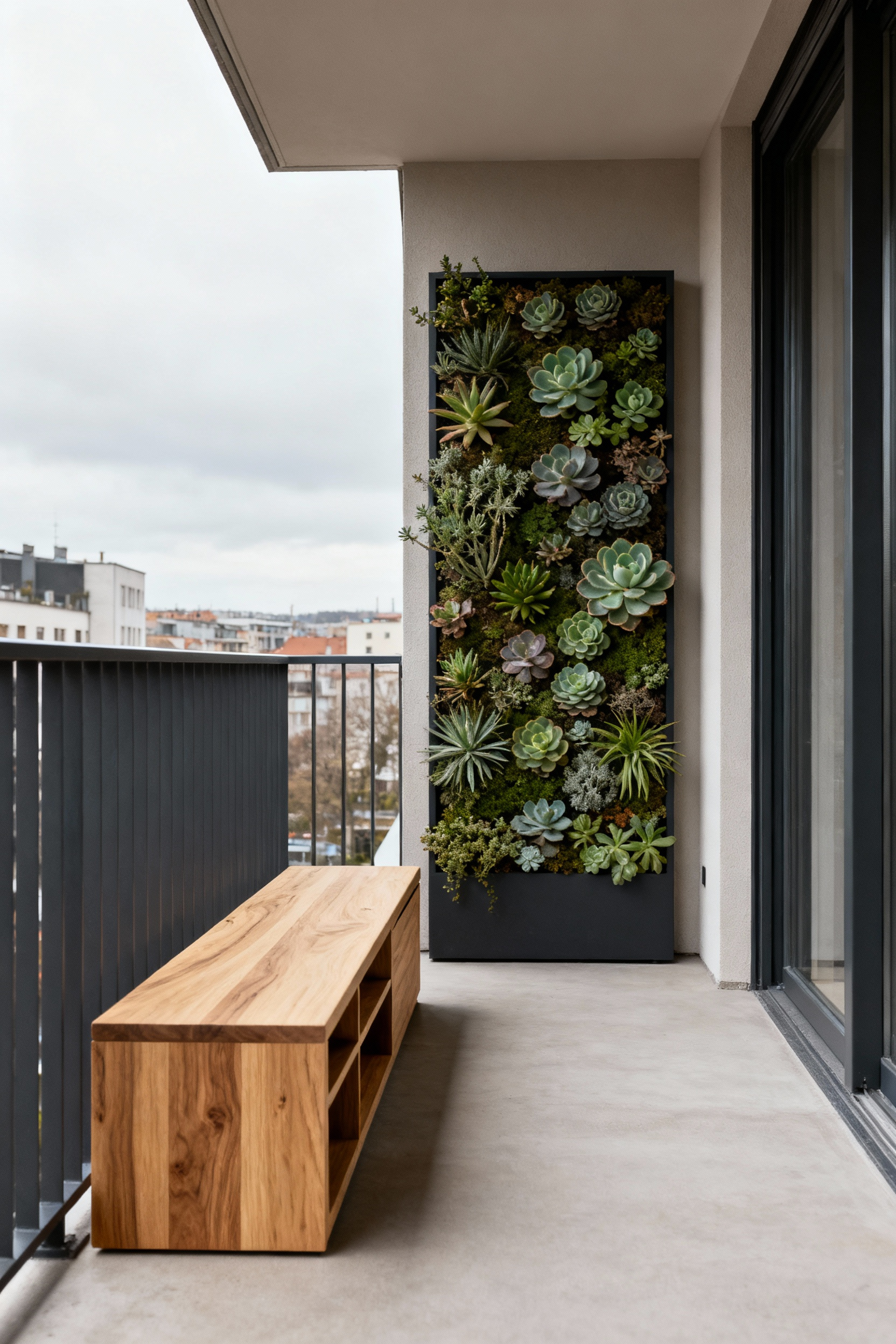
Instead of an oversized sofa that consumes every inch, lagom suggests a single, perfectly crafted wooden chair and a small table that can be folded away. It’s lighting that offers a warm, ambient glow rather than a glare. In my experience with Scandinavian design principles, the most peaceful spaces are those that leave room to breathe. Lagom isn’t about scarcity; it’s the quiet confidence of having exactly what you need.
We have an innate connection to the natural world—a principle known as biophilia. A balcony is our most immediate opportunity to honor that bond. This is more than just adding a few pots. It’s about creating an immersive experience that echoes the quiet rhythms of nature.
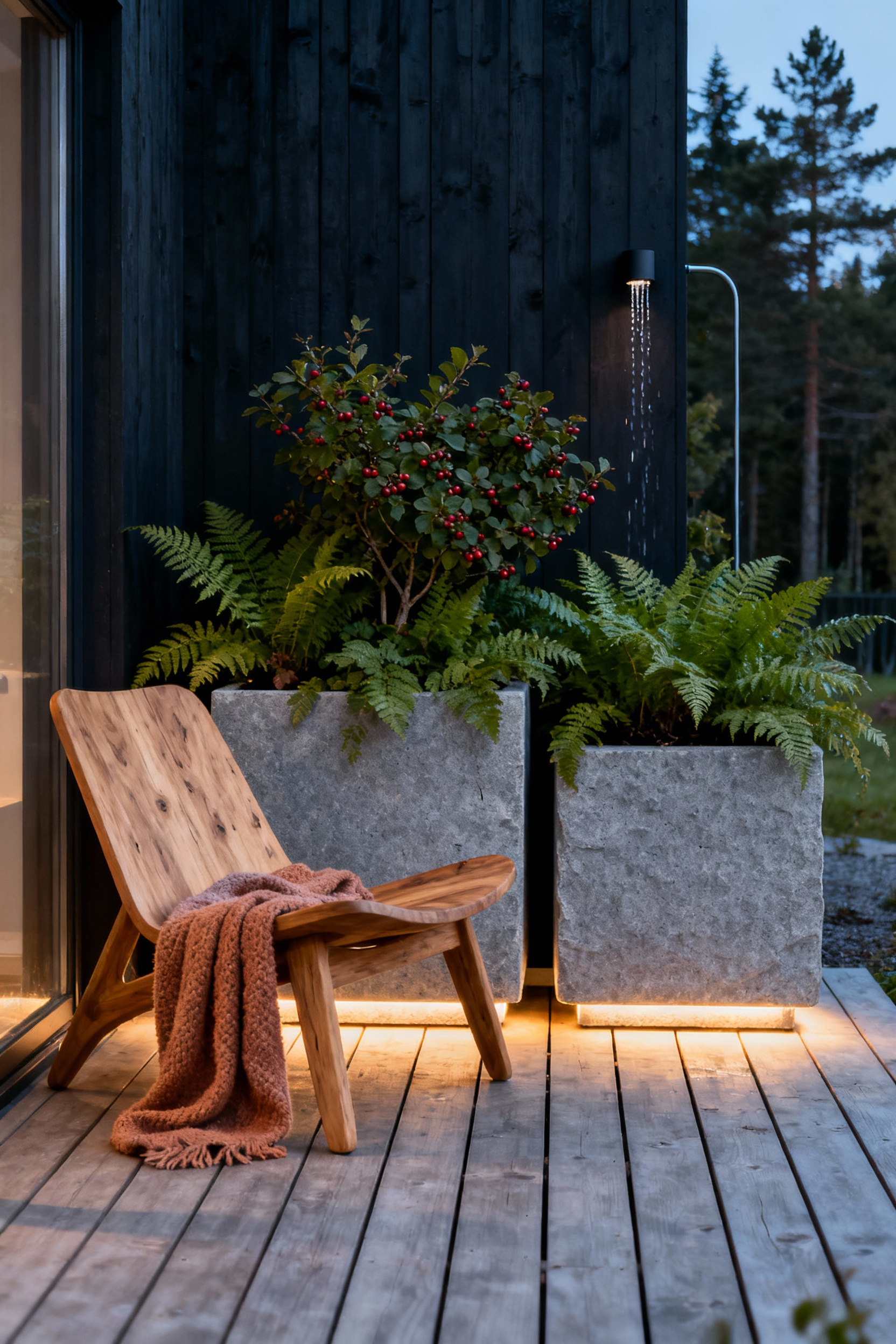
Start with your materials. Choose untreated wood that will silver with age, cool stone underfoot, and honest terracotta pots that show the marks of time. Bring in plants that offer year-round structure, like dwarf pines, and supplement with seasonal herbs for scent and texture. The goal is to build a living canvas where the rustle of leaves and the earthy scent after rain become part of the decor, fostering a profound sense of calm.
A space is truly felt when it engages more than just our eyes. A great balcony tells a story through sight, sound, touch, and even scent. Think beyond color and form. How does light move across the space during the day? What does it sound like?
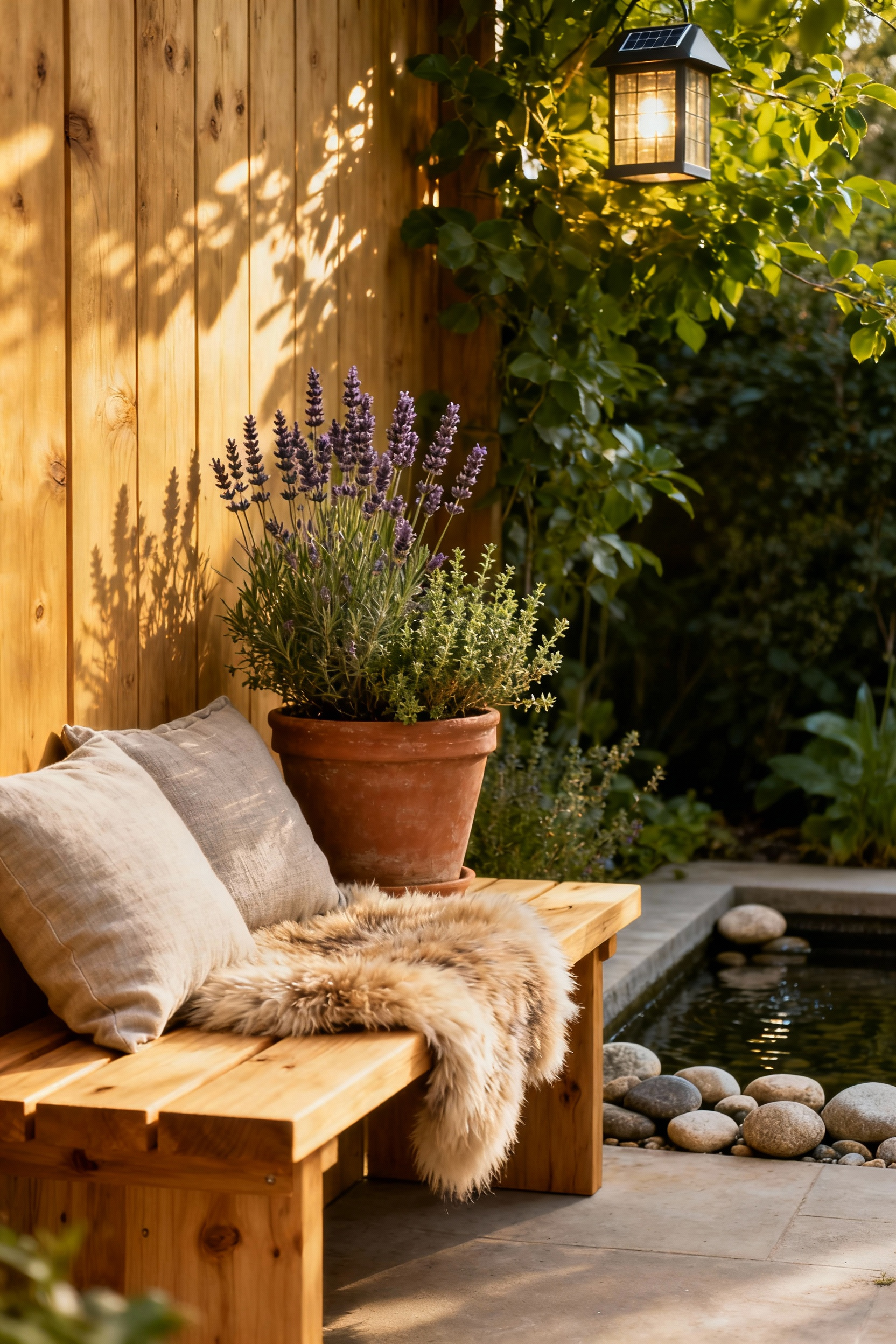
The feel of warm wood, the soft texture of a wool blanket, the cool smoothness of a ceramic mug—these tactile moments ground us. For sound, consider the gentle rustle of ornamental grasses or a small, subtle water feature to mask city noise. Scent is incredibly evocative. Plant aromatic herbs like rosemary and lavender, or light a simple pine-scented candle as dusk settles. It’s this layering of sensory details that transforms a space into a restorative haven.
In a world saturated with visual noise, a clear space offers a clear mind. Conscious decluttering isn’t about stark emptiness; it’s about creating visual quietude. Years of working with hygge principles taught me that a space free of excess allows us to truly connect with our surroundings and our own thoughts.
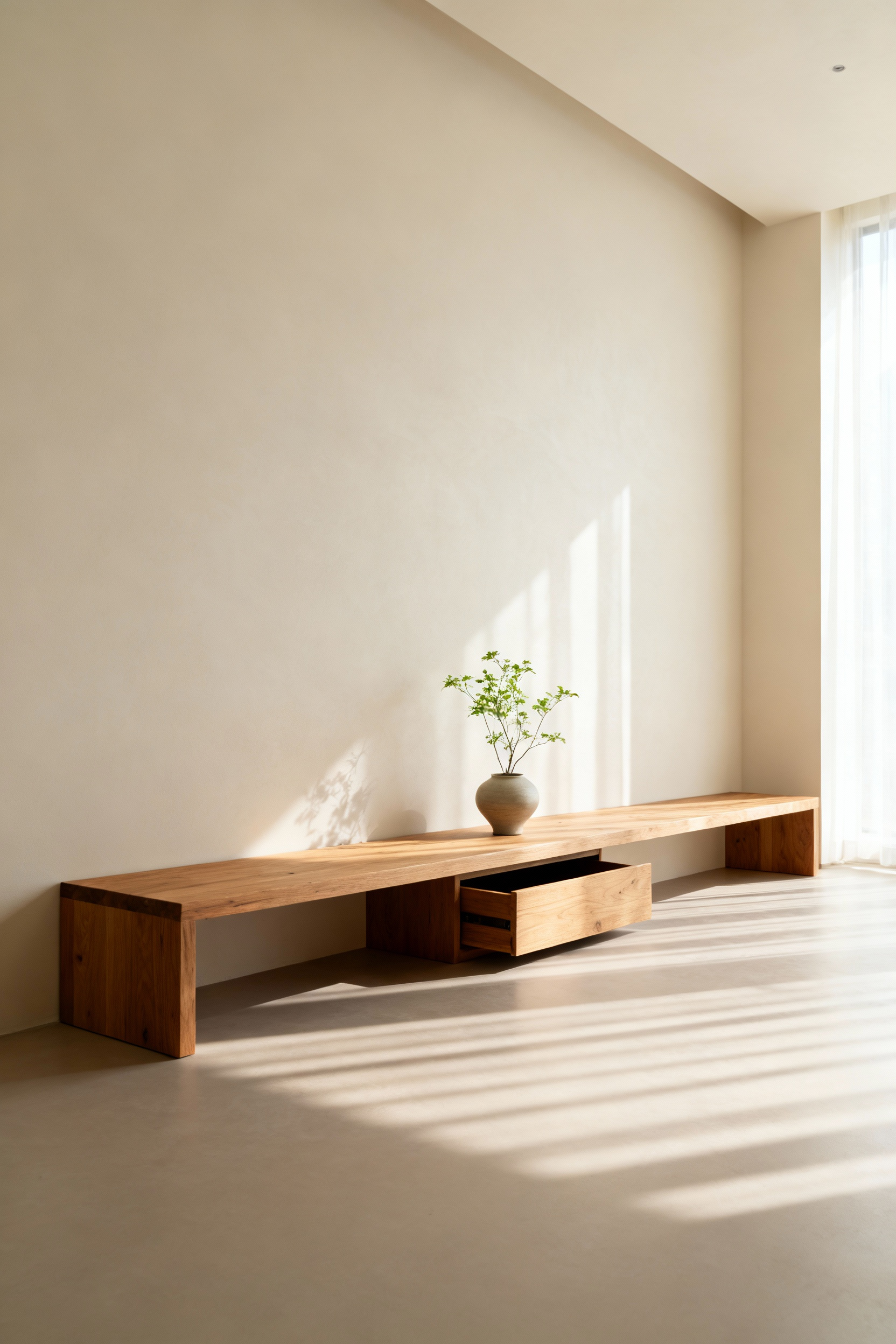
This means every element has a purpose. Does that collection of small, mismatched pots create harmony, or would consolidating them into three substantial, beautiful planters feel calmer? This is where thoughtful, integrated storage becomes essential. A bench with a hidden compartment or a vertical shelf system keeps the necessary tools of outdoor living tidy and out of sight. The most powerful element on your balcony is often the space you leave empty.
Before anything else, ask yourself: what is this space for? Is it a solitary retreat for a morning coffee ritual? A small garden to connect with growing things? An intimate spot for evening conversations? This core purpose is the anchor for every other decision.
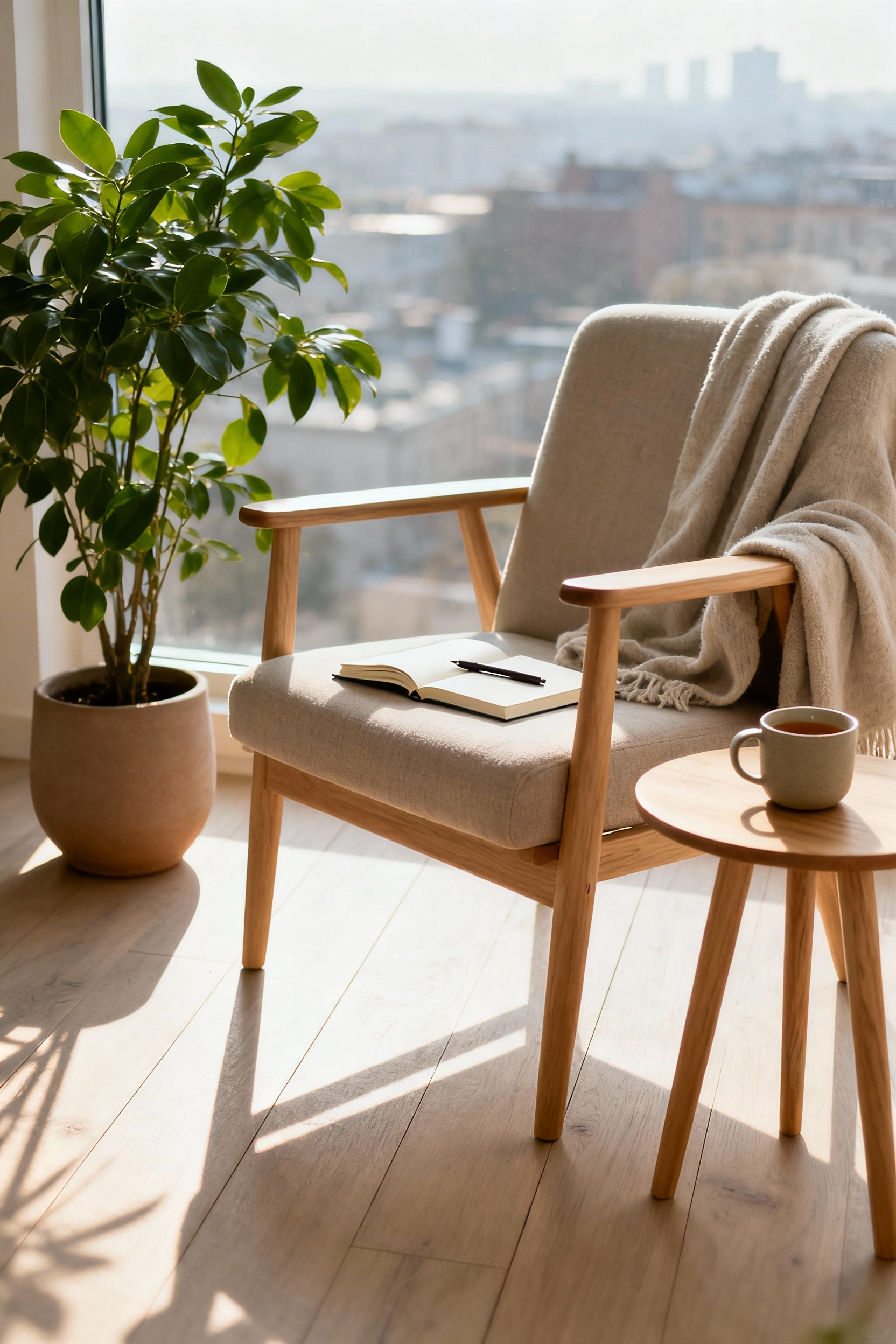
Without a clear ‘why,’ a balcony can become a collection of nice, but disconnected, things. But with a purpose, your choices become coherent. If it’s for quiet reading, a comfortable chair and good lighting are non-negotiable. If it’s for cultivating herbs, the planters and sun exposure take precedence. What I tell my clients seeking warm, minimalist spaces is to define the primary feeling they want to have there. Clarity of purpose is the secret to creating a balcony that truly serves your soul.
Our philosophy takes physical form through the materials we choose. Nordic design celebrates authenticity—materials that are honest, sustainable, and that grow more beautiful with time.
There is a profound beauty in materials that tell a story. Untreated timbers like teak, cedar, and acacia are chosen not just for their resilience but for the elegant patina they develop over time. Teak, rich with natural oils, silvers gracefully in the sun. Cedar offers its subtle, clean scent. These woods aren’t meant to look pristine forever.
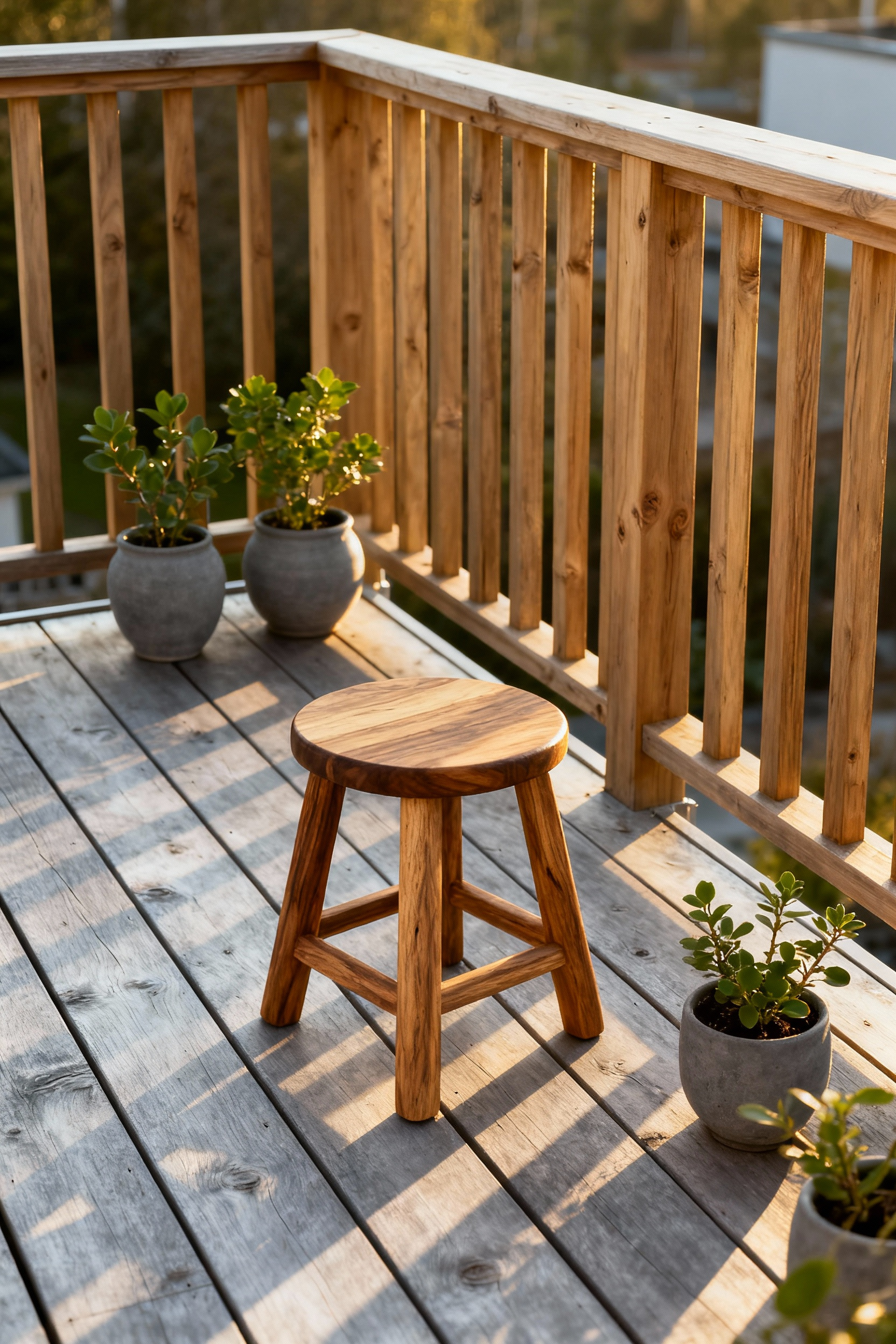
Their gradual aging is part of their character, a quiet testament to seasons passed. Using them for flooring, a simple bench, or even slatted privacy screens provides a warm, organic foundation. Choosing untreated wood is a conscious step away from the artificial and a step toward an aesthetic that values authenticity and endurance over perfection.
Soft textiles are what turn a well-designed space into an inviting one. Natural fibers like linen, wool, and organic cotton are essential for adding layers of comfort and texture. Linen is breathable and elegant, its natural wrinkles part of its charm. Wool, with its natural water-repellence, is perfect for a cozy throw on a cool evening—it’s the essence of hygge.
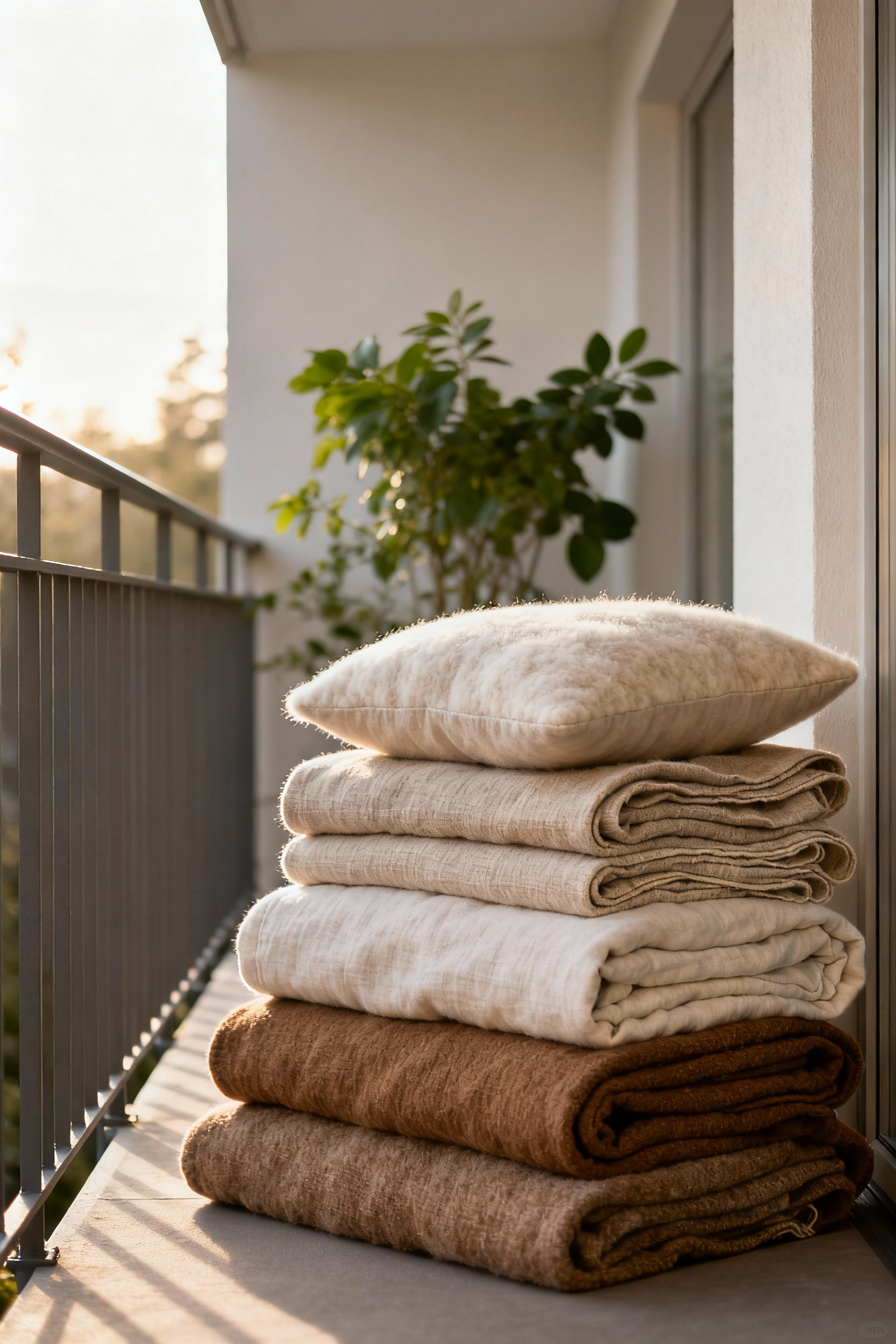
These materials connect us to a tradition of craftsmanship. Imagine the simple pleasure of linen cushions that grow softer with every use or a thick wool blanket that offers a comforting weight. Layering these textiles on seating or even as a simple outdoor rug softens the harder edges of your balcony and invites you to settle in.
Hand-fired ceramics and classic terracotta bring an essential, earthy weight that grounds a balcony. These are not just containers for plants; they are sculptural forms that connect the space to the earth itself. The rich, warm tones of terracotta are timeless, and its porous nature is a functional gift to the plants it holds.
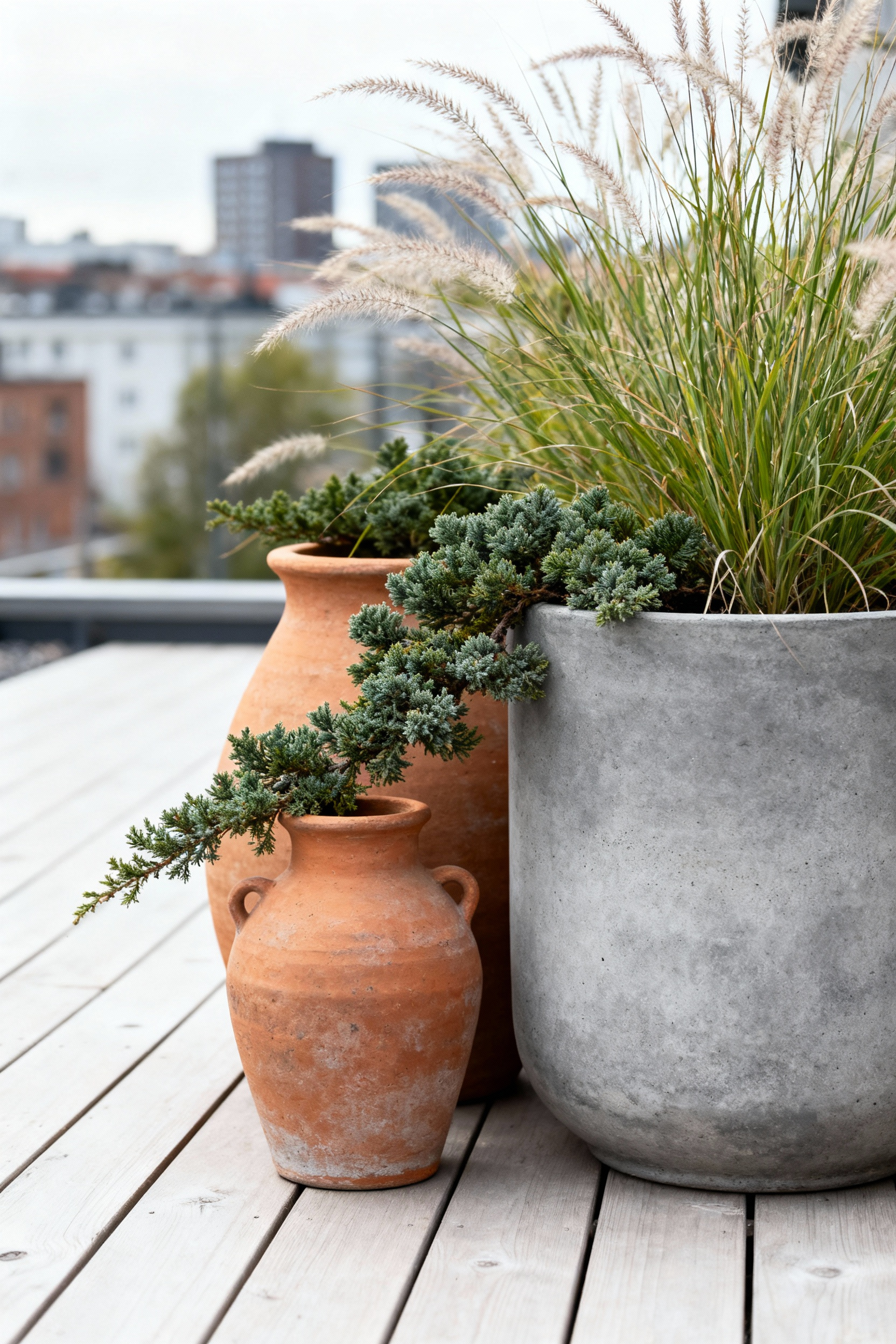
I’ve noticed that a collection of ceramic planters in varying sizes but a similar palette creates a sense of rhythm and cohesion. Their solid presence provides a beautiful contrast to the delicate life of the plants within. They are simple, honest objects that anchor the entire design in something real and elemental.
To introduce texture and a sense of lightness, we turn to woven materials. Rattan and willow balance robustness with a visually airy quality, embodying the grace of traditional craftsmanship. A beautifully shaped rattan chair can be a comfortable centerpiece without feeling heavy or bulky.
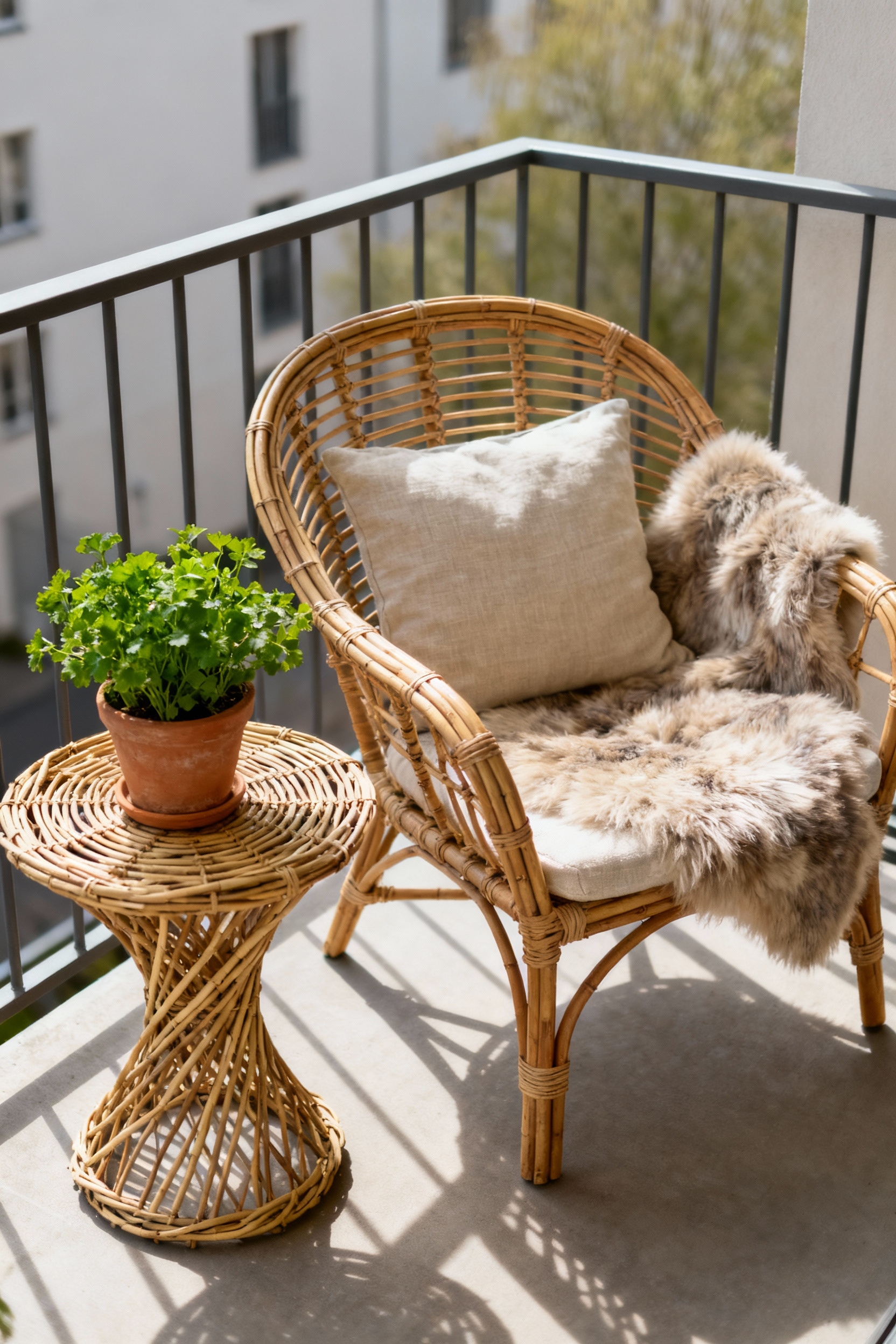
These organic forms soften the straight lines of architecture. Willow baskets can serve as beautiful planters or discreet storage, their woven patterns adding a layer of intricate detail. What’s interesting is how these pieces create a feeling of relaxed, informal elegance, inviting you to slow down and enjoy the moment in a space that feels both crafted and natural.
To truly ground a space, we can look to stone and concrete. Often considered cold, these materials, when used thoughtfully, offer a serene and timeless foundation. Their subtle textures and muted, earthy tones provide a stability against which softer elements can shine. A few smooth river stones in a planter, a simple slate tile underfoot, or a minimalist concrete side table can anchor the entire composition.
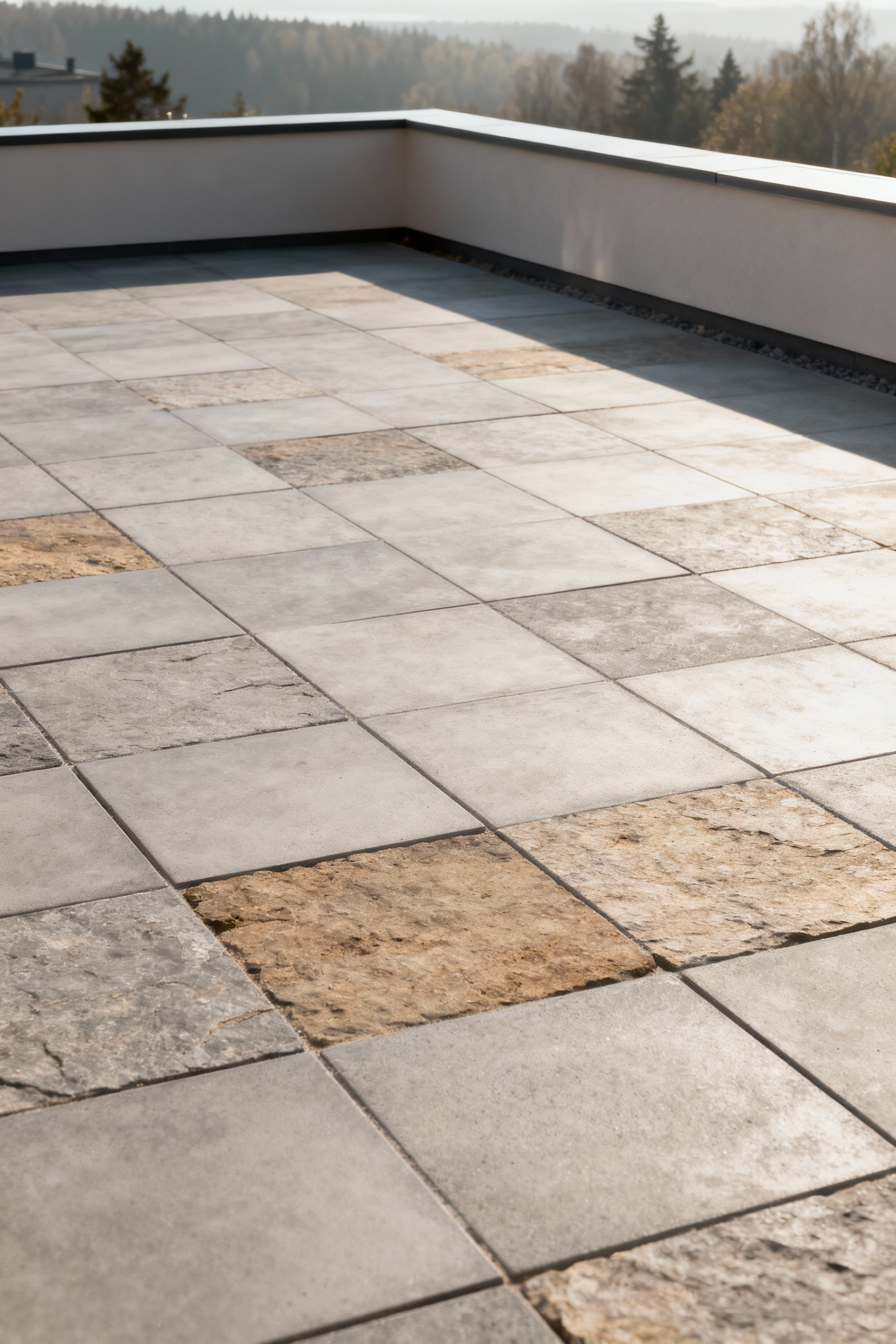
These elements speak of permanence. Their durability means they require little upkeep, embodying a sustainable ethos of buying once and buying well. I’ve seen this play out when a simple concrete bench, softened with a linen cushion, becomes the most peaceful spot on a balcony. It’s a reminder of the quiet strength found in the earth itself.
With our philosophy clear and materials chosen, we now turn to the art of arrangement. This is about more than just placement; it’s about shaping experience, ensuring functionality flows from an elegant and uncluttered design.
Even on a small balcony, you can create distinct ‘zones’ for different activities without building walls. This is about using subtle cues to articulate areas for relaxation, cultivation, or conversation. It’s a way to make a single space feel more expansive and versatile.
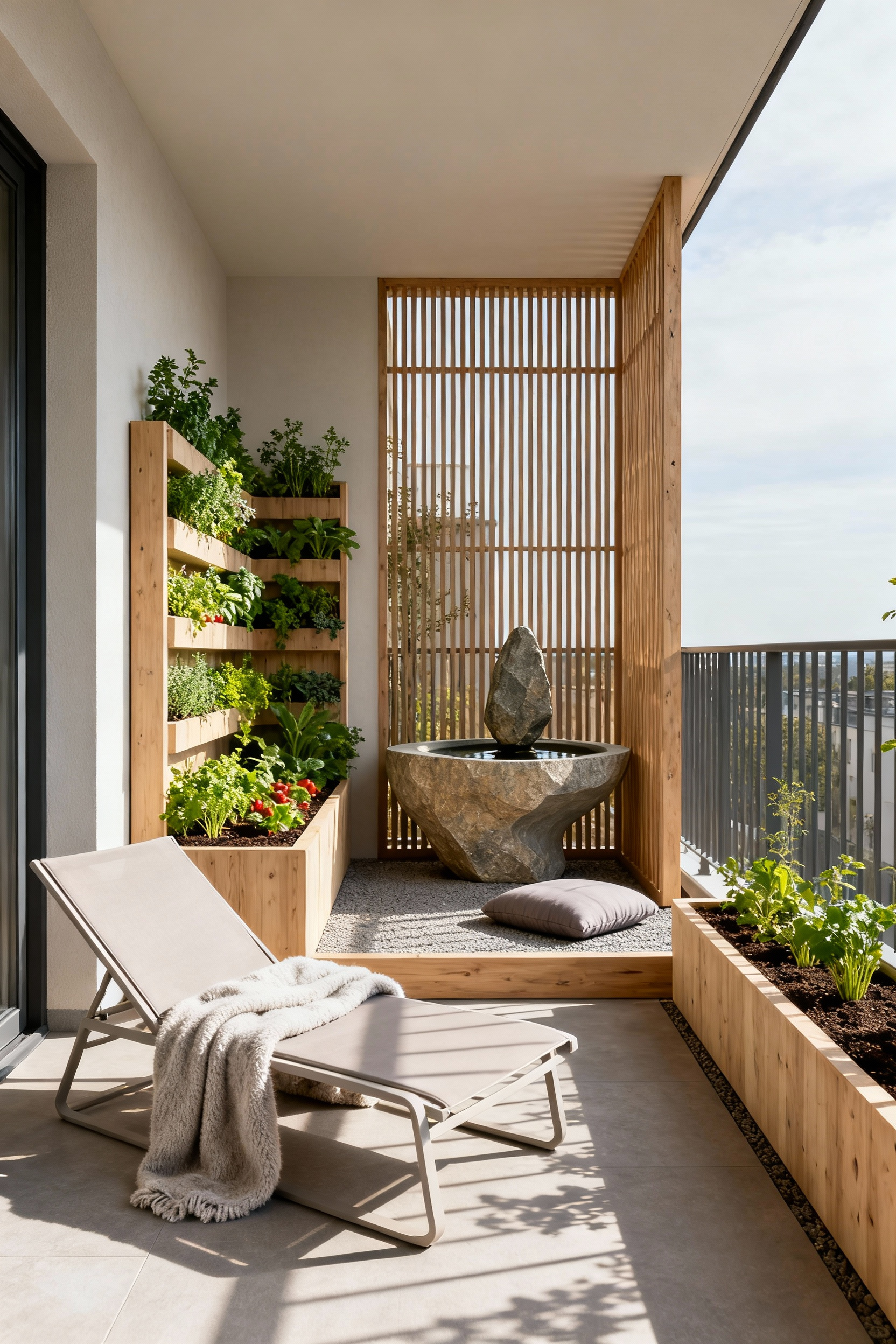
Use a simple outdoor rug to define a seating area. Group your planters together to create a ‘garden’ corner. A single tall plant or a delicate screen can create a sense of privacy for a reading nook. The goal isn’t to rigidly divide the space but to gently suggest different purposes, allowing your balcony to support the various rhythms of your day.
In any compact space, the greatest untapped resource is vertical. Walls are not just boundaries; they are opportunities. Tiered planters, wall-mounted shelving, and trellises for climbing plants can dramatically increase your green space without sacrificing a single square foot of floor.
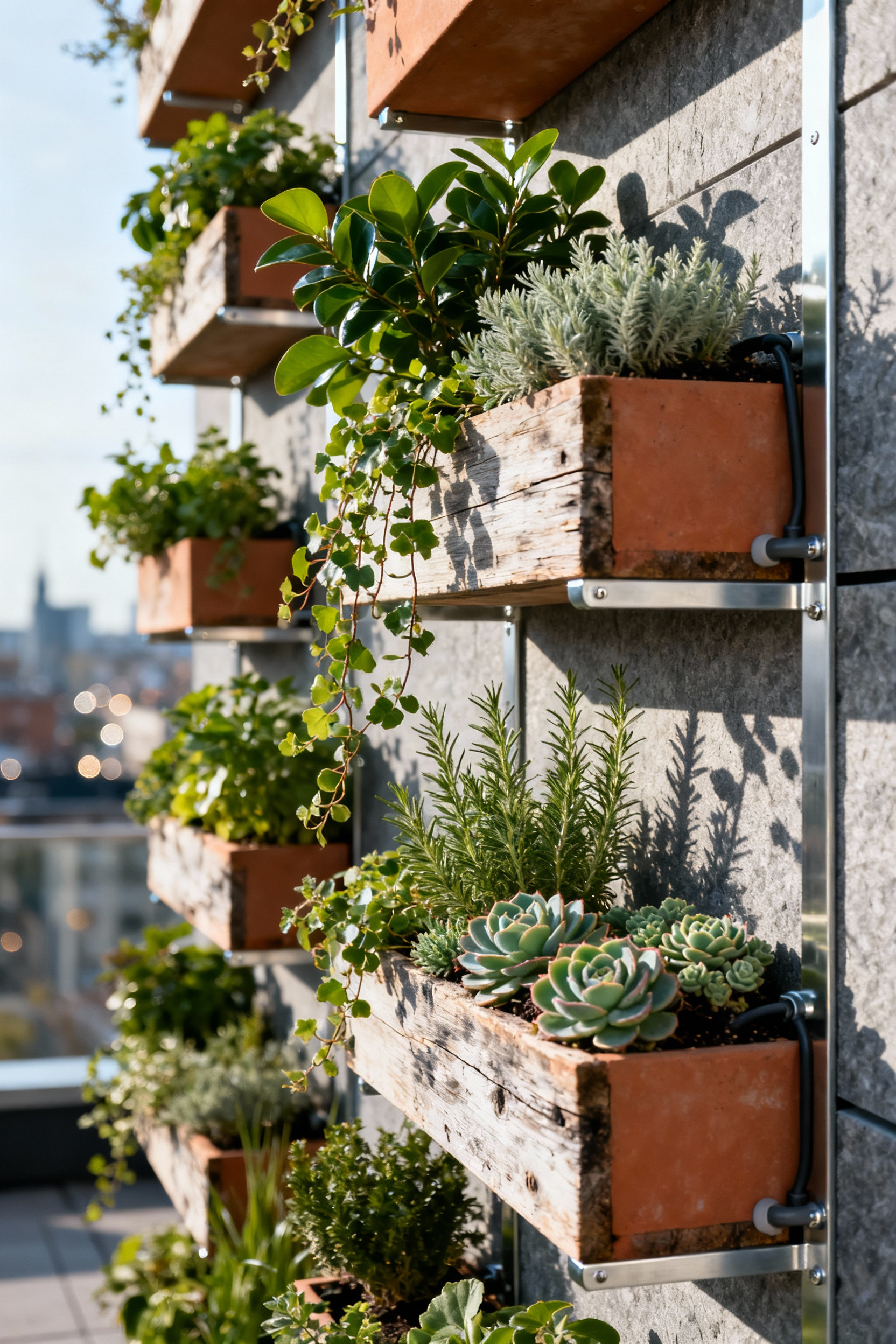
Imagine a wall covered in herbs, providing fresh ingredients right outside your kitchen. Or a trellis of jasmine, perfuming the air in the evenings. From my work in Nordic interior design, this principle is key: maximizing function within a minimal footprint. By growing upwards, you create a lush, immersive feeling that makes the balcony feel like a true green sanctuary.
Furniture that can adapt to your needs is the secret to a truly functional small space. Pieces that are modular, foldable, or multi-purpose offer incredible versatility. A bistro table that folds flat against the wall can free up space for morning yoga. A storage bench provides seating and hides away cushions and tools.
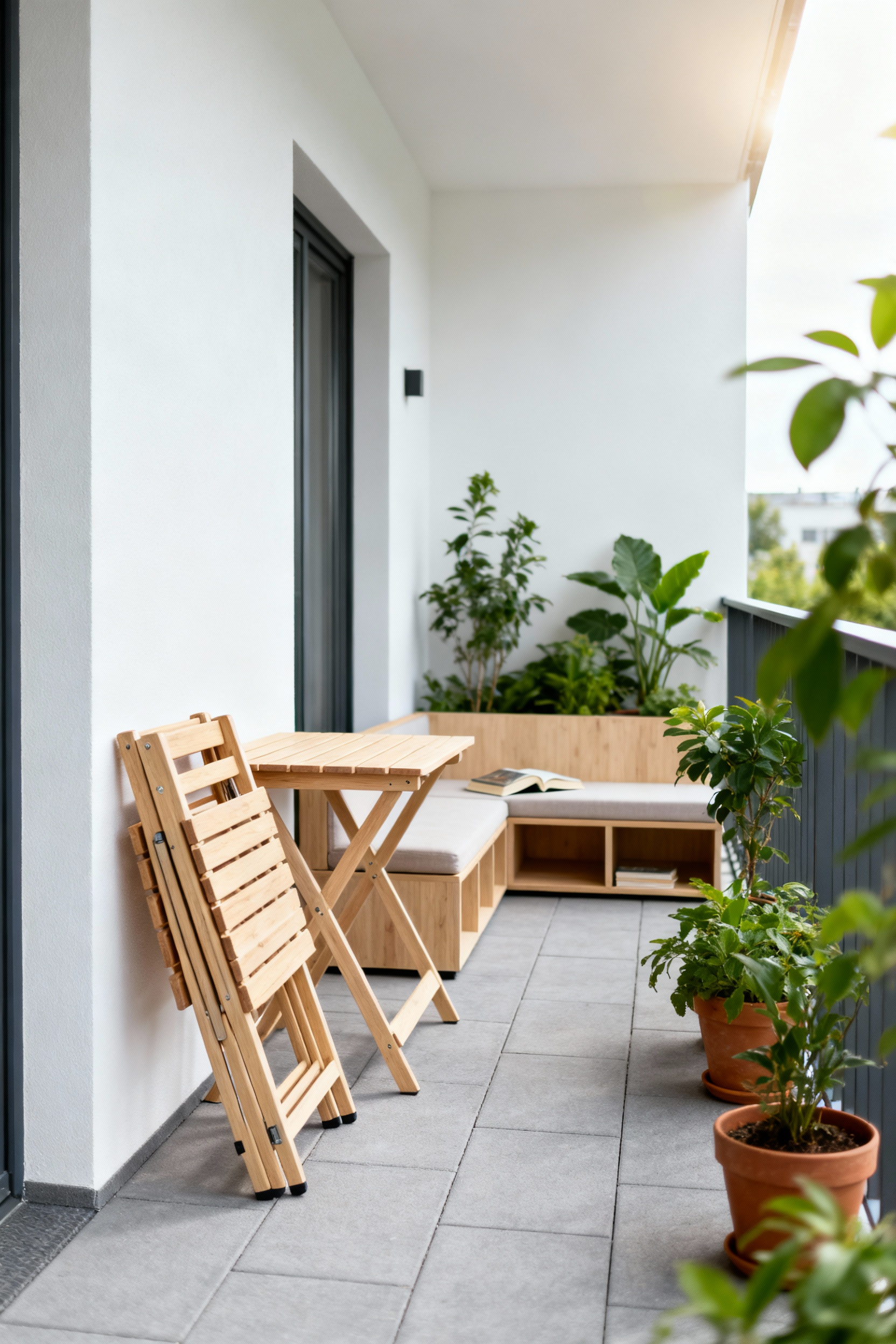
This isn’t about compromising on style; it’s about smart, thoughtful design. These pieces empower you to transform your balcony’s function in a moment—from a dining spot to a lounging area to an open space. It’s a reflection of a lifestyle that values efficiency and calm adaptability.
Light is one of the most powerful and often overlooked design tools. During the day, think about how sunlight moves across your balcony. But at night, you become the architect of the atmosphere. Thoughtful illumination can extend the use of your balcony long after sunset.
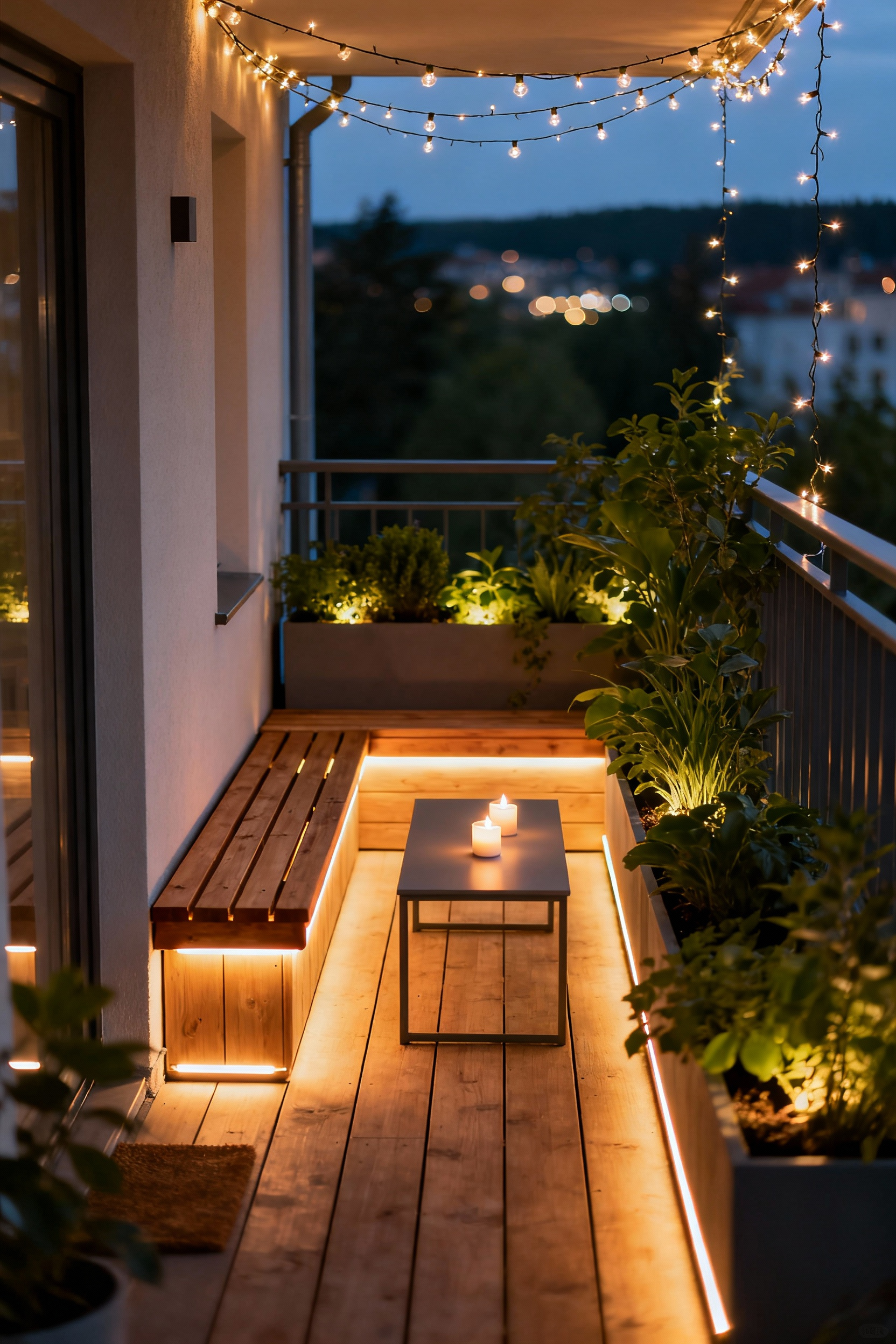
Layer your lighting. Use a base layer of soft, ambient light from string lights or lanterns. Add focused task lighting where you need it, like a small lamp by a reading chair. Finally, use accent lights to highlight a beautiful plant or a textural wall. This layered approach creates depth and a warm, cocooning feeling, making your balcony an inviting refuge at any hour.
Visual clutter is the enemy of tranquility. The best storage is the kind you don’t even see. A well-designed balcony has a place for everything, keeping surfaces clear and the mind calm. This requires integrating storage so seamlessly that it becomes part of the architecture.
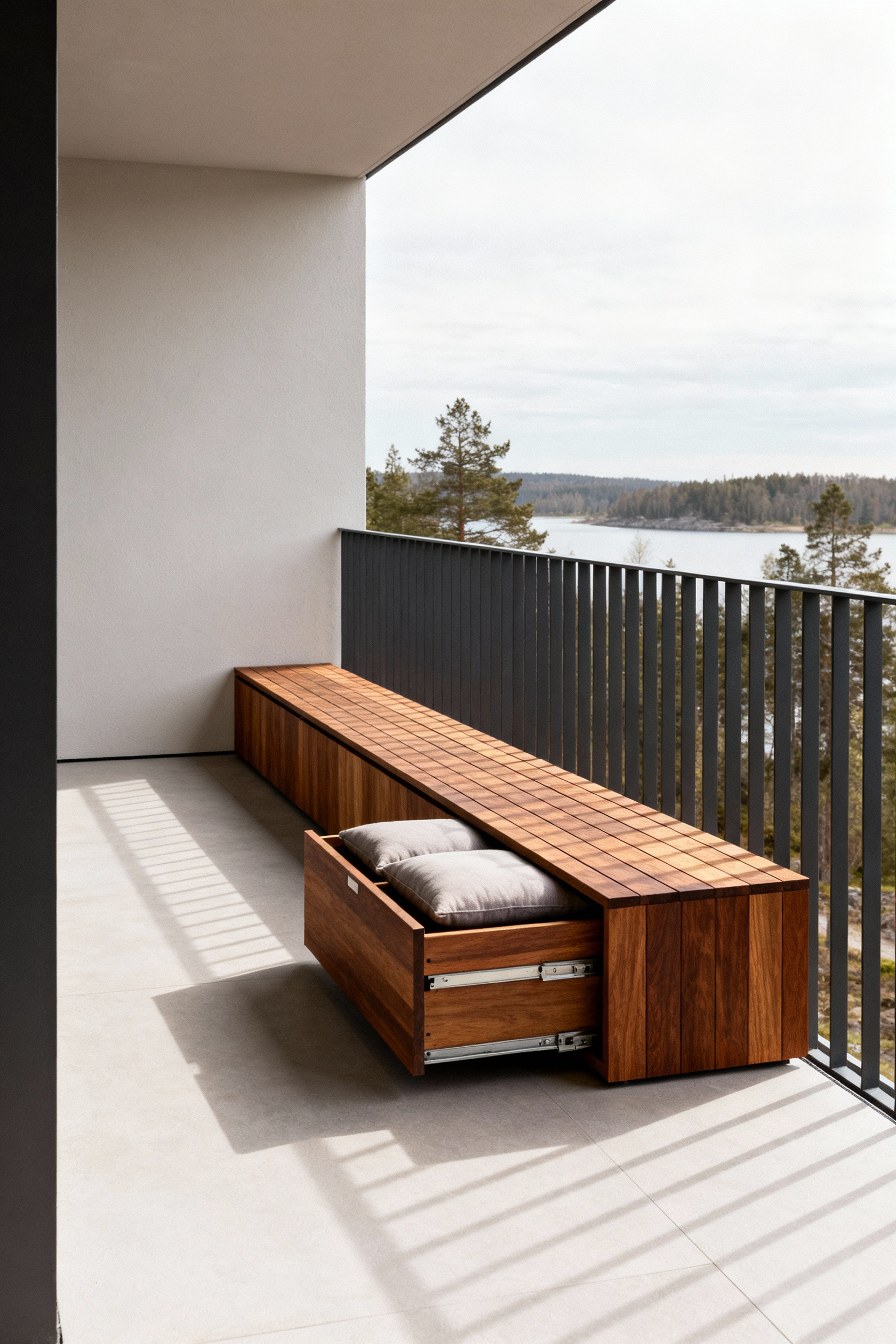
A built-in bench with a lift-up seat is the classic example. Custom planters can be designed with false bottoms to store small tools. Look for opportunities where function can be hidden within the form. When storage is this integrated, maintaining a sense of order becomes effortless, allowing the beauty of your carefully chosen pieces to take center stage.
A space truly comes alive when it becomes part of our daily lives. This final layer is about designing your balcony not just as a static scene, but as a stage for the small, meaningful rituals that foster contentment and well-being.
The Swedish tradition of fika—a mindful pause for coffee and connection—is a ritual worth designing for. Dedicate a small corner of your balcony specifically for this. All you need is a comfortable chair, a small table for your cup, and perhaps a view of the morning light.
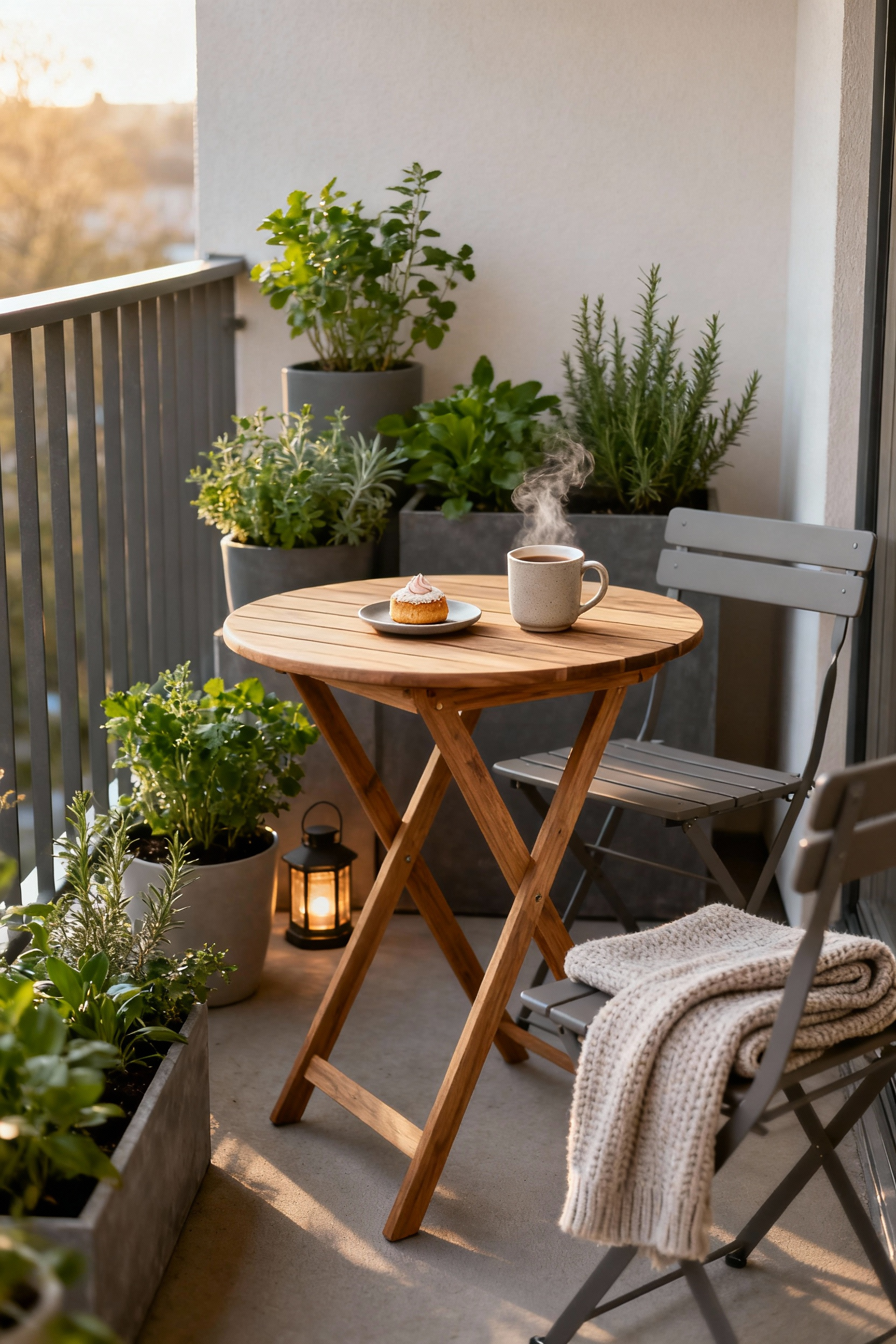
By creating a specific place for this ritual, you make it an intentional act. It becomes a non-negotiable moment of peace to start your day. It’s here that your balcony decor transcends aesthetics and actively contributes to your well-being, providing a physical anchor for a moment of quiet contemplation.
Nordic life is deeply attuned to the cycles of nature. Let your balcony reflect this. Don’t fight the changing seasons; embrace them. This is about making small, intentional shifts to your decor that honor the time of year.
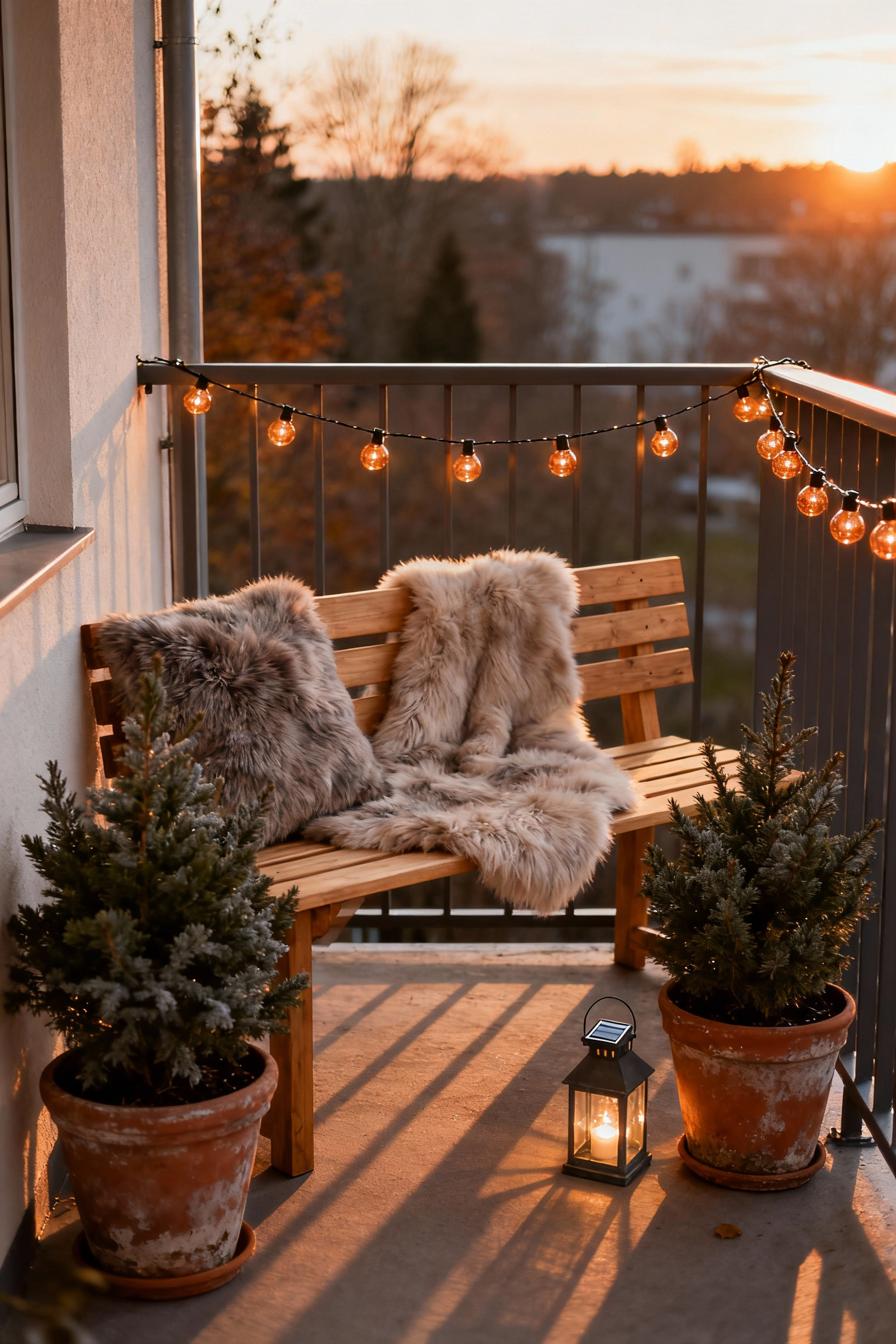
In autumn, add a heavy wool blanket, some small pumpkins, and lanterns for a warm glow. In spring, fill pots with fresh bulbs and swap heavy textiles for lightweight linen. I learned this when I first moved to a colder climate: aligning your immediate environment with the world outside creates a profound sense of connection and grounds you in the present moment. This practice turns your balcony into a dynamic space that is always in conversation with nature.
There is a unique joy in growing something you can eat. Even a few pots of herbs on a balcony can foster a powerful sense of self-sufficiency and connection to your food. A small collection of basil, mint, and rosemary not only adds life and scent to your space but also elevates your cooking.
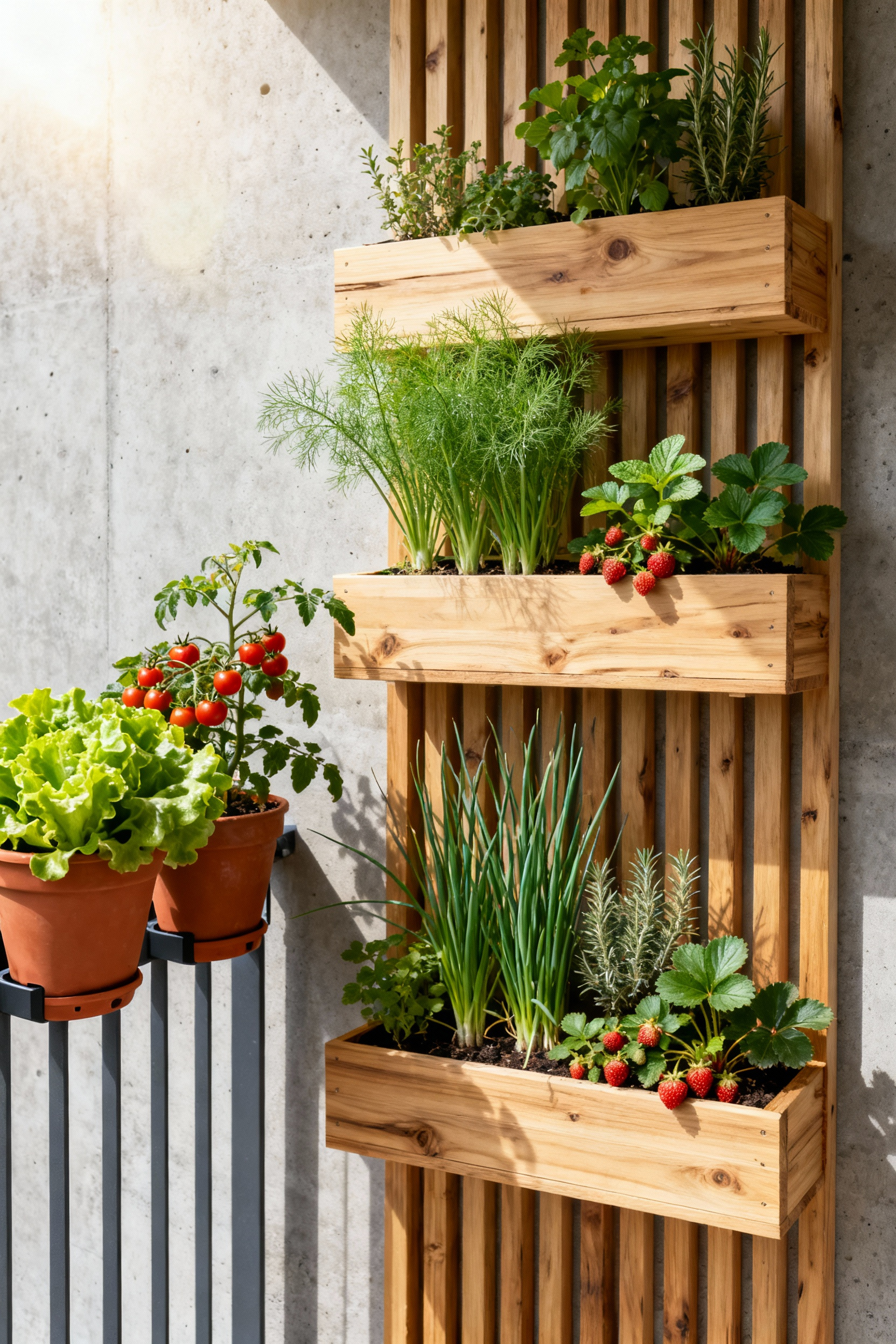
This simple act integrates your balcony into the daily ritual of preparing meals. Stepping outside to snip fresh herbs connects you to the cycle of growth in a tangible way. It’s a small but deeply rewarding practice that infuses your balcony, and your life, with purpose and vitality.
True sustainability is about choosing things that last. Part of this is selecting materials that can withstand the elements, but another part is embracing the beauty of aging. A wooden bench that silvers, a copper lantern that develops a green patina—these are signs of a life well-lived.
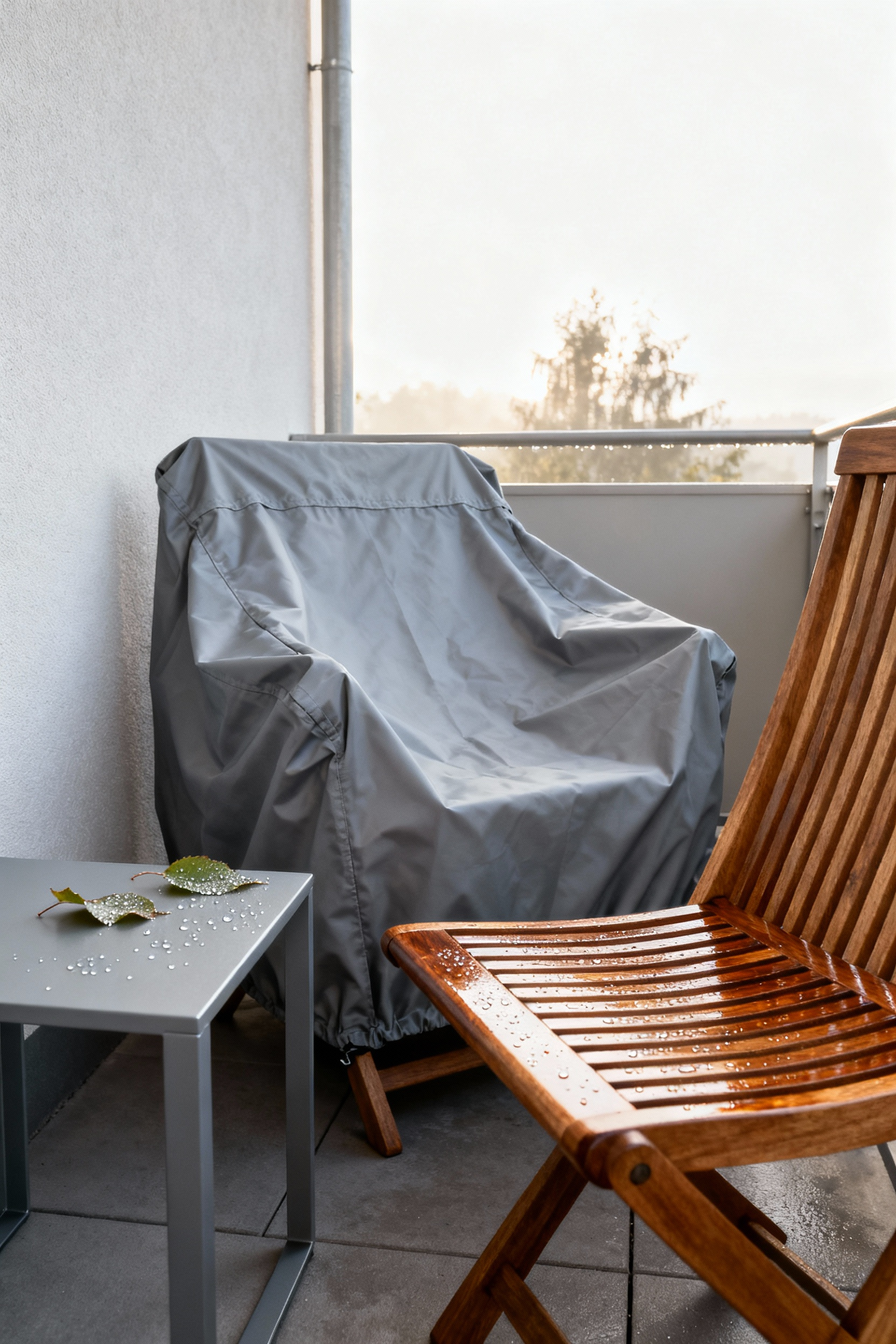
Invest in quality pieces and maintain them with simple, mindful care. Oiling wood or covering furniture during harsh weather becomes a small ritual of stewardship. This philosophy rejects throwaway culture and instead fosters a deeper appreciation for the things we own, allowing our balcony to tell a story of endurance and grace.
Finally, your balcony must be a reflection of you. After all the principles and guidelines, this is the most important part. Add those few, thoughtfully chosen objects that hold personal meaning. It could be a sculpture made by a friend, a collection of stones from a favorite beach, or a unique, hand-thrown planter.
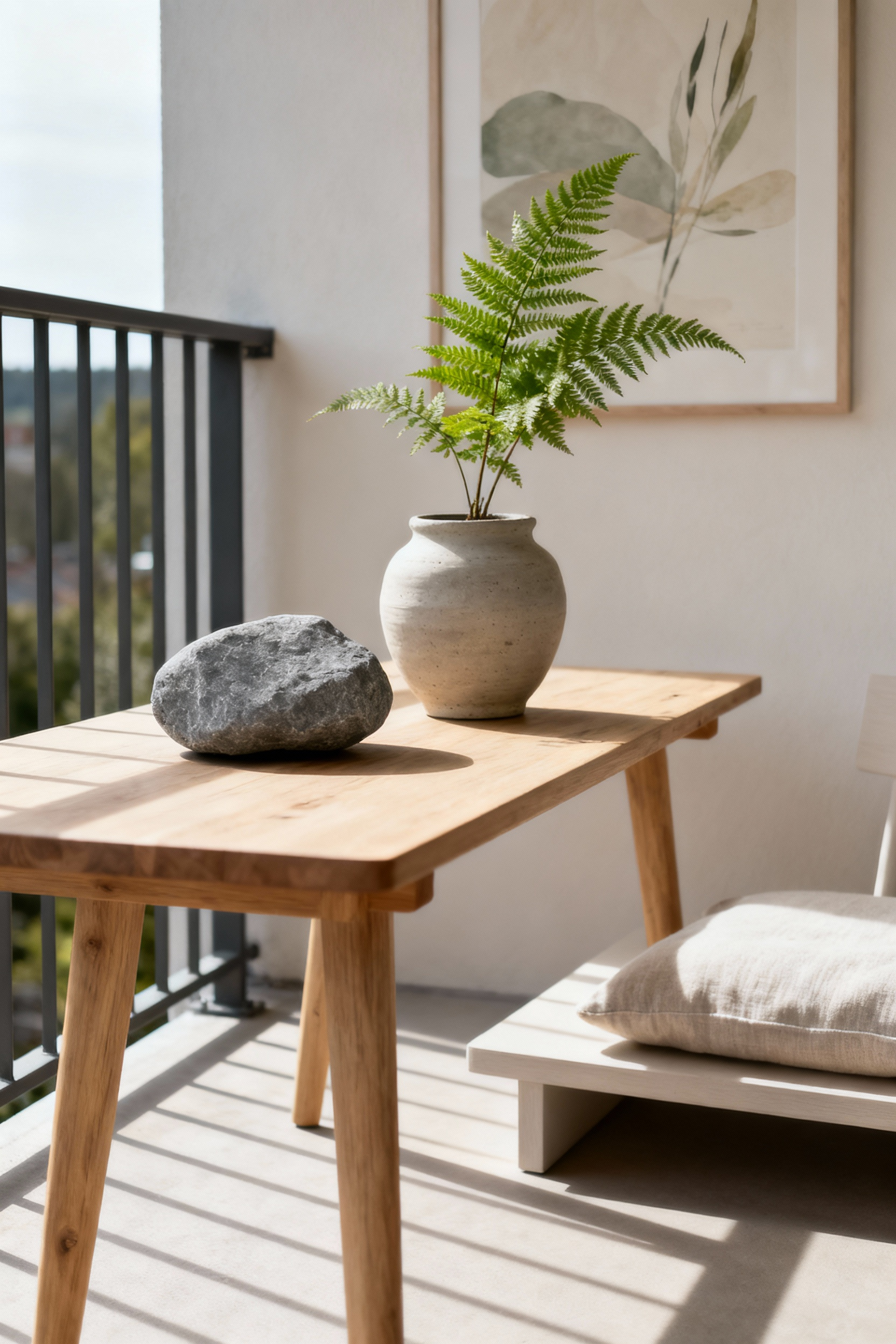
These are not clutter. These are the elements that infuse the space with your unique character and turn it from a well-designed balcony into your personal sanctuary. What really gets me is when a space tells an authentic story about the person who lives there. These objects are the final, poetic punctuation marks that make the narrative truly your own.
In the end, creating a balcony guided by these principles is about so much more than balcony decor. It is a quiet, deliberate act of shaping your world to better shape your life. We began with the idea that our spaces are reflections of our inner values, and through these 20 steps, we’ve traced a path from abstract philosophy to the tangible realities of wood, stone, light, and life. This is the Nordic way—finding profound contentment not in excess, but in the thoughtful simplicity of a life well-curated.
Your balcony is an invitation. An invitation to step outside, to connect with nature, to find a moment of peace in a busy world. I encourage you to see it not as a project to be finished, but as an ongoing dialogue—a space that will evolve with you and the seasons. Let it become a testament to quality over quantity, a refuge that nurtures your spirit daily. May it be a beautiful, enduring space that doesn’t just please the eye, but truly nourishes your soul.